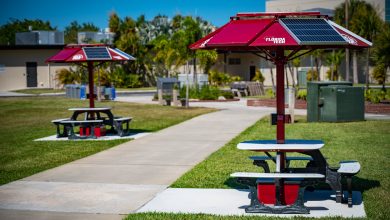“Be the person that your younger self needed.”
Sherri Emer earned in Ph.D. in biology in 2013 from Florida Tech and is currently the university’s animal program compliance officer.
Tell us a little bit about yourself? What are you passionate about?
As the current Animal Program Compliance Officer at FIT, I work with the Institution’s Animal Care and Use Committee to ensure health and welfare of university animals and that the animal use program and facilities comply with federal, state and local regulations.
Because I am interested in the behavior and physiology of animals in the wild and in captive environments, I enjoy contributing time to a diversity of projects, from diamondback terrapin studies in the Indian River Lagoon to studies of rodents on the International Space Station.
What inspired you to pursue a STEM education and career?
I grew up on the Chesapeake Bay and in the Washington D.C. metropolitan area, so at an early age I was exposed to a lot of nature within the geographic region and also all things science during frequent visits to the Smithsonian Air and Space and Natural History Museums. My neighbor, Uncle George (we were not related, but I considered him family), worked for NASA’s Goddard Space Flight Center, and he always talked to me about space exploration and gave me memorabilia from various shuttle missions. A young child, I was devastated by the loss of Challenger, and my interests shifted to wild animals. I began volunteering on nature projects led by one of my public school teachers, Kathy Chow. She was the first to teach me about data collection and the relationship of living things to the physical environment. Uncle George has been gone for several years, but I still communicate with Kathy and even conduct nature surveys with her when I visit the area.
What do think are some of the most shared/common challenges women in STEM fields encounter?
Uncertainty, and lack of support and encouragement. Most women have probably at some point asked themselves at least one of these questions. Am I smart enough for a STEM field? Is this the “right” career path given that STEM fields are male-dominated? Is it okay to take time off from my work—does it mean that I’m not passionate? Is it okay to spend so much time on my work to be successful in my STEM field? Is a particular experimental design good and appropriate—what if it fails? It is important that women in STEM recognize that they are not alone, and that other women share the same challenging questions.
Gender bias, by men and women. A recent study showed that men and women STEM faculty across the country perceived a female lab manager job applicant as less competent, even though the resume was identical compared to that of the male applicant. It was also recommended by faculty that the female job applicant receive less pay compared to the male applicant. This sounds crazy given that it is 2016, but gender bias is a reality of which women in STEM should be aware because they can be a voice for change and equality.
How have you overcome obstacles/challenges as a woman in STEM?
I keep moving—both mentally and physically. Being a woman in STEM is a roller coaster with occasional detours on the track. I learn new skills that are unrelated to my field because I can often apply them to my work in unique ways. I also maintain a healthy lifestyle to keep my body functioning at an optimal level, and I am mindful to devote time for myself and to relax. I think that stepping outside of your comfort zone results in a strong mind and body that helps you to readily adapt to changes and continue making progress.
Knowing what you know now, what advice you would give your younger self?
Support and encourage one another, be the person that your younger self needed. I can think of so many occasions when I could have benefited from advice from another woman with more life experience, but there was not one. With all of the tasks and events of everyday life, sometimes we need someone with similar biology, experiences and situations to pick us up when we feel defeated.
What one takeaway would you want to impart on a young woman thinking of pursuing an education/career in STEM?
Devise logical, thoughtful plans as much as you can, but be prepared to let them go. Accept that there is no success without failure.
What is an aspect of being a woman in STEM you were surprised to discover?
In academia and in the media we so often hear discussions of low numbers of women in STEM. But, the reality that I have experienced is that there are many girls and young women that are interested in STEM careers, they just seek guidance on how to pursue their interests and accomplish their goals. It also seems that women in STEM tend to be risk takers; they are fearless when it comes to their specific research area!
In your experience, what are the top things leaders could do to encourage more young women to enter STEM fields?
We often devote much time to showing the surface of science and how “cool” and fascinating it can be. It is just as important for young women to be actively involved in the processes surrounding STEM work, where they are provided with opportunities that allow them to develop confidence in themselves and their abilities. A critical component to such opportunities is to provide young women with resources for personal evolution, success, and progress, such as women mentors to whom they can turn for advice and support when the science and the STEM atmosphere become overwhelming.





